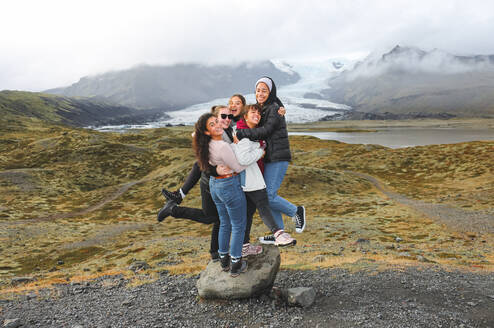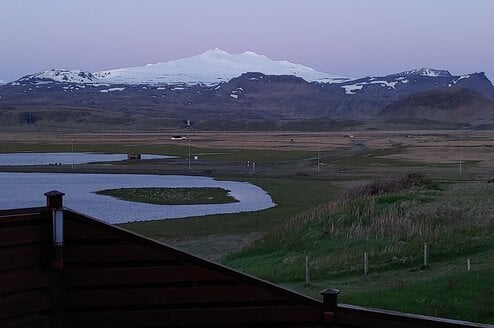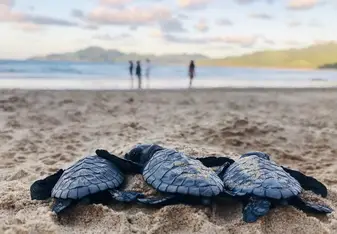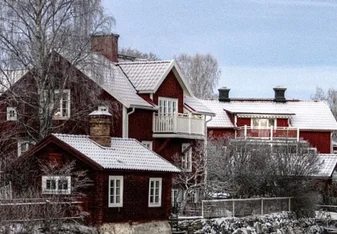Volunteer in Iceland
Volunteer Programs in Iceland
About
When you think of Iceland, what comes to mind? For many, you imagine picturesque waterfalls, stunning blue glaciers, the dancing northern lights, rugged and otherworldly scenery, and the friendly warmth of Icelandic people despite the millions of tourists that flood Iceland each year.
If you want to visit Iceland but want to do more than just sightseeing, consider volunteering in Iceland. There are a variety of opportunities for volunteers in both long-term and short-term volunteer placements in cities and towns like Reykjavik, and in the stunning countryside.
No matter what type of volunteer work you choose to do in Iceland or where your volunteer program takes place, you can easily explore this wildly popular destination on your weekends and get a sense for what makes Icelanders so proud to call their island country home.
Program Types
The most popular type of volunteer work in Iceland is in the broad field of environmental conservation. Iceland has stunning natural beauty, but it won't stay that way if everyone who comes to visit tramples all over the mountainsides and glaciers. If you're passionate about the environment and want to see it protected, Iceland offers great opportunities to make a real impact.
Trail-Building & Maintenance
We've all seen it: after tens of thousands of travelers visit, the trail widens, the railings fall down, and the surrounding area is trampled. This is an unfortunate reality when people visit natural sites, and building and maintaining trails in Iceland can go a long way to keep fellow travelers stay 'on the path' -- literally. If you enjoy the physical effort and work involved, there are ways to help support trails in Iceland for day-visitors and trekkers alike, at Iceland's national parks and natural wonders.
Scientific Research
If you have a research background, you could look into volunteering work with companies in Iceland studying the environment and economy. Common topics for research include climate change and tourism -- no place has seen the impact of these two powerful forces more clearly than Iceland in the past decade!
Education
It's often overlooked, but an important part of environmental conservation and preservation is in educating people on its importance. If you love the environment and working with people, you can help visitors understand why following the rules when viewing those waterfalls or chasing the northern lights are so important. This may mean volunteering at visitor centers or as a tour guide to help educate your fellow travelers in Iceland on the delicate nature of the ecosystem and why their work to help preserve it matters too.
Planning Your Trip
There are some important logistics to keep in mind while planning your volunteer trip to Iceland.
Where to Volunteer in Iceland
Your options for where to volunteer in Iceland are varied: you can choose a city like Reykjavik, smaller towns, or the countryside. Typically the type of volunteer work available to you will vary tremendously depending on whether you're in an urban or rural setting. For example, volunteering in a city or town may be more closely related to tourism, education, or social outreach; volunteering in the country may involve trail building and maintenance or other physical work to conserve the environment.
Housing & Accommodation
Housing options vary widely too: some volunteer companies will offer some form of housing as part of what your volunteer fees cover; this is especially common if you're working in the countryside with limited housing options. Just be prepared that you may not be staying in a five-star hotel if your volunteer work involves a multi-day trail-building trek through the Icelandic countryside!
Housing may not be provided in some cases, especially in urban volunteering placements. Instead, you may need to look for your own housing, which could range from a hostel or Airbnb depending on the length of your volunteer work. You could check about homestay options too, if you want a deeper immersion in Icelandic culture through staying with an Icelandic family.
Language Requirements & Tips
While the official language of Iceland is Icelandic, the vast majority of people, especially those working with tourists or volunteers, will likely speak good English. English is one of the main subjects taught in school in Iceland, which helps non-Icelandic speakers travel and volunteer throughout the country.
Did you know the Icelandic alphabet has 32 letters? If you have an interest in foreign languages, try and learn some Icelandic while volunteering there!
Visas for Volunteering in Iceland
Iceland is a member of the European Union, and also part of the Schengen visa zone. This means that if you hold a European passport, you don't need a visa to travel to or volunteer in Iceland for up to 90 days; this might vary slightly if you receive any form of compensation for your volunteer work, so be sure to check with your volunteering provider before you turn up without a visa! Similarly, U.S. and Canadian visitors to Iceland can enter for up to 90 days; again, if you're volunteering, be sure to check that you don't need to apply for any special visa depending on the type of work you'll be doing.
Health & Safety
In general, the health and safety considerations for Iceland are quite minimal. As a volunteer in Iceland, you won't face many hurdles to an enjoyable experience.
Health
Iceland does not require any special immunizations, but there are some standard ones you should be aware of. The U.S. Centers for Disease Control and World Health Organization recommend the following immunizations for travel to Iceland: hepatitis A, hepatitis B, rabies, meningitis, polio, measles, mumps and rubella (MMR), Tdap (tetanus, diphtheria, and pertussis), chickenpox, shingles, pneumonia, and influenza. These are pretty common immunizations that you would be advised for any travel to any country in Europe.
Another important health consideration is your own ability to do the volunteer work you're setting out to do. For more manually-laborious work like trail-building and trekking, you need to know your own limits. Parts of Iceland, like all natural environments, can be dangerous if you don't know what to do or have the proper equipment. Check with your volunteer provider in advance for any special conditioning they advise or gear they recommend you bring.
Safety
Iceland is by and large one of the safer countries in the world, and is consistently ranked among the top 5 safest countries. While traveling in a foreign country, it's always important to keep close tabs on your necessary documents (like your Passport and ID), but for the most part, you don't need to be as worried about petty crime as you may in other countries. In general, it's also always good to be aware of your surroundings when traveling in an unfamiliar place, so you don't find yourself in an unsafe situation.











